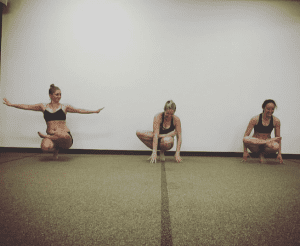by Ann Chrapkiewicz
In my 14th year of practice in this amazing yoga lineage, I continue to love and appreciate the steadiness and auditory meditation that comes from the near-constant instruction from the teacher. I enjoy the rhythm of the “dialogue” – which truly is a two-way exchange of information between student and teacher! – and its phrases, or the flow of an expert teacher using his or her own tremendous experience and unique instructions to guide us. I love silent classes, too.
But lately I have really been enjoying a verbal dialogue in the form of questions from regular students – during class, between postures. Sometimes they are highly technical and have to do with joint alignment and body part placement.
Others, like today’s question, are more philosophical or rhetorical:
“When is this going to get easy?”
I especially love questions that bring up more questions.
What do you mean by easy?
This question instantly made me ponder the nature of what it means for something to get easy.
Does “easy” mean that I struggle less? Does “easy” mean that I can do something on auto-pilot, somewhat mindlessly? Does “easy” mean that the story in my head is telling me that I am “good” at what I am doing?
It all depends on what I was conditioned for it to mean, and what I will choose consciously for it to mean, going forward.
“Easy” vs. “ease”
“Easy” is not a word I ever really associate with Bikram Yoga. In fact, in the first few months I practiced, I was always thinking, “Why is this not getting any easier? Why am I not getting “good” at this? This is unlike anything I have ever done before – things usually get easier for me.”
But it didn’t stop me. I felt so good after class that I would come back the next day for more. My bulimic and OCD behaviors stayed away, as long as I practiced regularly. My stress-induced terrible breathing was miraculously disappearing. And my focus and calm for my schoolwork were like nothing I had ever experienced before.
These things were important. Whether the yoga was getting easier – whatever that meant – wasn’t really on my list of priorities, nor did it have anything to do with whether I was going to keep going to class.
The lyrics to one of my favorite songs, by Michigan musicians The Crane Wives:
“Nothing worth doing comes easy.”

I have come to see that something in many of our white North American subcultures has taught us that we should not have to struggle. This shows up in people’s responses to this yoga on many occasions:
“That’s hard.” “Yoga is supposed to be soothing and easy.” “I just worked all day; I do not want to go to yoga to work any more.”
I suppose it is important to figure out what things in life we are willing to work for, and what things we think should just be given to us without effort.
The greatest challenge offers the potential for the greatest reward.
Do I really want everything handed to me while someone feeds me grapes and fans me, and offers me ice water, and offers a cloth to wipe my face, and offers me everything I have ever wanted, without me having to lift a finger? That would be an “easy” life.
Do I want to be able to mindlessly and easily move through the postures within a year (or many) of regular practice? Then what?
Do I expect to be able to change the structure of my bones and joints, the chemistry of my blood, and the patterns of my thoughts… without an awe-inspiring challenge?
I believe that that thinking needs to change if we are going to move into a healthier place as a neighborhood, city, state, and country.
In my experience, working hard for health, healing, and self-realization are the most rewarding places for a challenge.
